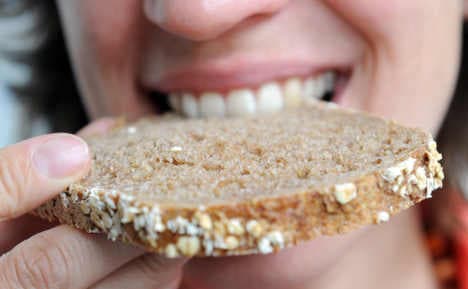Study: 'War on gluten' trend misdirected

“Gluten-free” may have become synonymous with choosing a healthy lifestyle, but research by scientists in Mainz suggested on Monday that shunning gluten may not be the answer.
“Gluten sensitivity” applies to people who have not been diagnosed with Coeliac disease – a genetic autoimmune disorder – but who report a relief of symptoms such as diarrhoea and bloating when they cut gluten out of their diet.
Scientists as of yet have failed to grasp the phenomenon, which researchers from the University of Guttenberg, in Mainz, decided to have a closer look at.
They compared immune responses to traditionally-grown wheat with high-output varieties. Their results found a link between gluten sensitivity and the Adenosine Triphosphate Amylase (ATI) protein, which is found in larger quantities in high-output wheat.
ATIs are natural insect repellents and modern farming techniques grow high ATI-containing crops to increase their yield. This could explain why gluten sensitivity has been on the rise.
But study author Detlef Schuppan is cautious about interpreting the results. “The whole thing is very new,” he told news magazine Der Spiegel. “We need more data from clinical trials to deduce the consequences for patients.”
Other experts are keen to dispel the myth that a gluten-free lifestyle is healthier.
“Gluten-free diets are of no benefit to healthy people,” said Stephanie Baas of the German Coeliac Society (DZG). “Gluten gives food its taste and holds dough together, giving baked goods a pleasant consistency. When it’s left out, manufacturers have to add more sugar and fat to bread, cake and biscuits.”
She also cautioned against trying to lose weight by adopting a gluten-free diet, pointing to the fact that the more people who adopt a gluten-free diet by choice, the harder it will be to diagnose Coeliac Disease, which is at present only discovered by patients who suffer the adverse consequences of eating it.
If left undiagnosed, Coeliac disease could lead to further complications such as osteoporosis and intestinal tumours.
Dieticians also warn consumers not to be taken in by deceptive labelling.
In Germany there have been cases of cheese and plain chocolate being labelled as “gluten-free,” though neither of the products normally contain gluten. And in Spain, even some brands of mineral water make the claim.
The Local/kkf
Comments
See Also
“Gluten sensitivity” applies to people who have not been diagnosed with Coeliac disease – a genetic autoimmune disorder – but who report a relief of symptoms such as diarrhoea and bloating when they cut gluten out of their diet.
Scientists as of yet have failed to grasp the phenomenon, which researchers from the University of Guttenberg, in Mainz, decided to have a closer look at.
They compared immune responses to traditionally-grown wheat with high-output varieties. Their results found a link between gluten sensitivity and the Adenosine Triphosphate Amylase (ATI) protein, which is found in larger quantities in high-output wheat.
ATIs are natural insect repellents and modern farming techniques grow high ATI-containing crops to increase their yield. This could explain why gluten sensitivity has been on the rise.
But study author Detlef Schuppan is cautious about interpreting the results. “The whole thing is very new,” he told news magazine Der Spiegel. “We need more data from clinical trials to deduce the consequences for patients.”
Other experts are keen to dispel the myth that a gluten-free lifestyle is healthier.
“Gluten-free diets are of no benefit to healthy people,” said Stephanie Baas of the German Coeliac Society (DZG). “Gluten gives food its taste and holds dough together, giving baked goods a pleasant consistency. When it’s left out, manufacturers have to add more sugar and fat to bread, cake and biscuits.”
She also cautioned against trying to lose weight by adopting a gluten-free diet, pointing to the fact that the more people who adopt a gluten-free diet by choice, the harder it will be to diagnose Coeliac Disease, which is at present only discovered by patients who suffer the adverse consequences of eating it.
If left undiagnosed, Coeliac disease could lead to further complications such as osteoporosis and intestinal tumours.
Dieticians also warn consumers not to be taken in by deceptive labelling.
In Germany there have been cases of cheese and plain chocolate being labelled as “gluten-free,” though neither of the products normally contain gluten. And in Spain, even some brands of mineral water make the claim.
The Local/kkf
Join the conversation in our comments section below. Share your own views and experience and if you have a question or suggestion for our journalists then email us at [email protected].
Please keep comments civil, constructive and on topic – and make sure to read our terms of use before getting involved.
Please log in here to leave a comment.